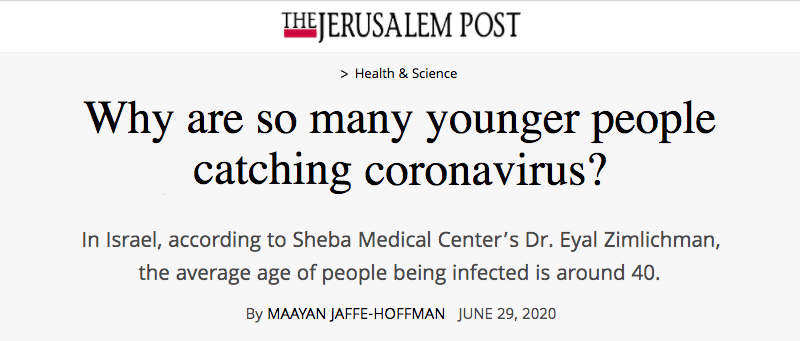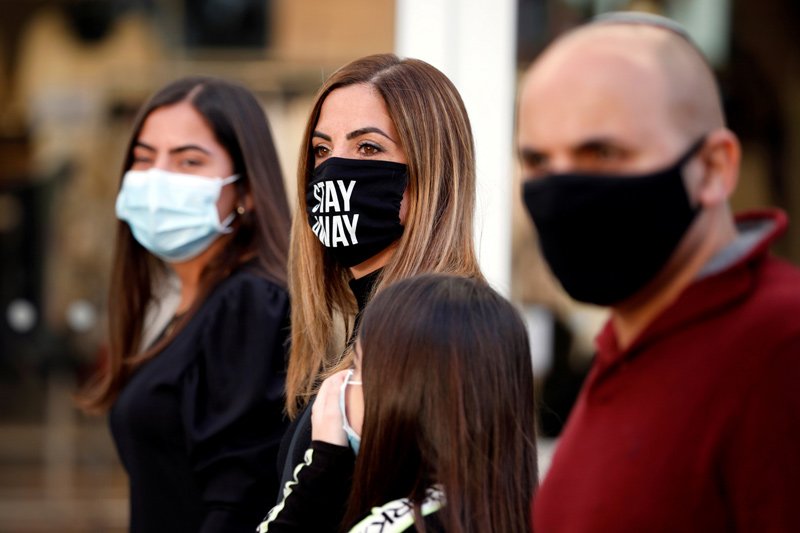

As data on this renewed wave of coronavirus is starting to be analyzed, it appears that the average ages of people being infected in Israel and around the world are slightly younger than they were in the spring. Experts explain that this is likely because young people are more social and less likely to adhere to recommendations and also because more testing is being carried out.
In Israel, according to Sheba Medical Center’s Dr. Eyal Zimlichman, the average age of people being infected is now around 40.
This trend can also be seen in the United States, as noted by scientists at the World Health Organization. Recent data from Florida, Texas and Arizona – states that continue to have high rates of infection – indicate a sharp rise in patients aged 40 and younger.
In Florida, specifically, the median age for coronavirus patients dropped from 65 at the beginning of March to 36 last week, according to the Florida Department of Health. In South Florida’s Broward County, the median age of infection was even younger, at 33, the Sun Sentinel reported. But it was higher in Miami-Dade (41) and Palm Beach (40).
However, the virus has not changed, scientists told The Jerusalem Post. Rather, the behavior of young people has shifted as restrictions were lifted, and they are putting themselves and the rest of the public at risk.
“The young people are not taking precautions,” said Dr. Rivka Abulafia-Lapid, a Hebrew University of Jerusalem expert in microbiology, immunology and viruses. “They are not wearing masks or careful about hygiene and social distancing – and this virus is very contagious.”
She said she sees young people in restaurants, cafes and clubs pretending as if the virus has gone away.
“These young people think they are not going to get infected or they will not be very sick,” Abulafia-Lapid continued. In contrast, “older people wear their masks, keep distance and wash their hands” because they understand that they are most at risk.
Another reason for the increase in young patients, at least in Israel, is that the country is doing more testing, she said.
When Health Minister Yuli Edelstein took office, he changed Israel’s testing policy, opening up the possibility of getting screened to all who believe they may have been in contact with a sick person. As such, testing has gone from fewer than 10,000 people per day to an average of 17,000 per day.
But Cyrille Cohen, head of the immunotherapy laboratory at Bar-Ilan University, said the challenge with younger people getting sick is that they can spread the virus to older adults.
For example, Galia Barkai, head of Sheba Medical Center’s telemedicine program, told the Post the hospital’s coronavirus ward is starting to see more patients in recent weeks, and their ages are starting to rise.
Cohen said it is likely that within a short time, “unless older people stay secluded, I don’t see how they won’t be affected. The only thing to prevent this is to keep older and younger people apart, but grandparents want to see their grandchildren.
“Slowly, the infection will be in older people if nothing is done to prevent that,” he concluded.
Moreover, Abulafia-Lapid said while in most cases young people are correct that they will not become sick from coronavirus – overall, as many as 80% of people who are infected are asymptomatic or develop only mild symptoms – this is not always the case.
“Younger people can also develop the disease, COVID-19, and have harsh symptoms,” she noted. “We don’t always know what we have in our bodies, and we don’t always know what will happen when the virus enters our bodies.”
According to Abulafia-Lapid, around 5% to 10% of people below the age of 55 who contract COVID-19 develop a serious case.
Moreover, recent studies show that there can be aftereffects of even mild cases of coronavirus for months to come. A study released this week by Jerusalem’s Shaare Zedek Medical Center showed that more than half of patients diagnosed with coronavirus exhibit general weakness and respiratory distress several weeks after recovery whether they had a mild, moderate or serious case of the disease.
Additionally, there have been multiple cases of children and teens in Israel and around the world who require admission to intensive-care units with a multisystem inflammatory condition following recovery from the virus. This phenomenon is now being referred to as pediatric inflammatory multisystem syndrome temporally associated with SARS-CoV-2, or PIMS-TS in short.
“We have to learn that we are responsible for ourselves and everyone around us,” Abulafia-Lapid said. “This is something everyone should think about.”